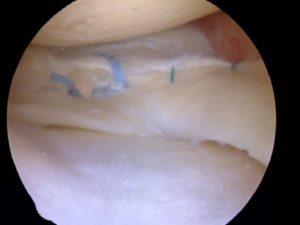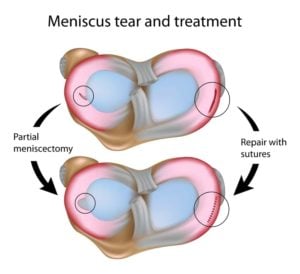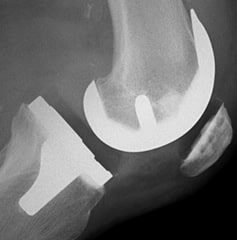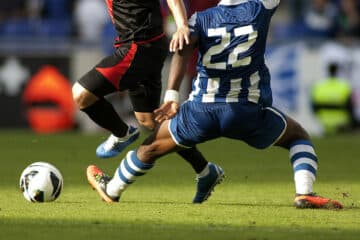
The meniscus is a cartilage disc and cushion within the knee. Meniscus tears are common in athletes. Surgical removal of a the meniscus tear is referred to as a partial menisectomy. If an elite athlete requires a partial menisectomy, then research shows that the athlete has a significant chance of developing osteoarthritis. To minimize the risk of developing knee arthritis, many surgeons may recommend a meniscus repair, instead of a partial meniscectomy. During a meniscus repair the torn meniscus is sutured together. A meniscus repair may provide protection against developing arthritis from a meniscus tear.
Knee injuries are more common in contact sports. Meniscus tears and ACL injuries are both very common in young football players. Osteoarthritis can be the end result of a severe knee injury. The elite athlete most at risk for osteoarthritis had a partial menisectomy, or removal of a torn meniscus.
Osteoarthritis is the long term, end result of chronic repetitive damage to the knee, or it can be due to the long lasting effects of one or more severe injuries resulting in the need for knee surgery. It is well known that professional football players have a high incidence of knee osteoarthritis. Until recently we knew little about the incidence of osteoarthritis in the elite, college level football player.
Partial Menisectomy in College Athletes

One in 4 American Football players at the NFL Combine with a history of knee surgery have knee osteoarthritis despite being only 20 to 26 years of age.

Partial Menisectomy and Knee Arthritis
This was one of the first studies to follow young elite football players to determine their risk of developing osteoarthritis following a partial menisectomy or ACL reconstruction. Much more research is necessary. We also need to carefully consider advising a meniscal repair versus a partial menisectomy (removing torn meniscus) in young elite athletes.
Partial Menisectomy or Meniscus Repair
When faced with a meniscus tear in an elite athlete there is significant pressure to return that athlete to the playing field. A meniscus repair will result in a far longer recovery due to the need to allow the meniscus to heal. A partial menisectomy will result in a quicker return to play…. but that comes with a potentially significant long term cost to the health of the athlete’s knee. Preference should be given to a meniscus repair and recent studies show that more meniscus tears are in fact repairable than previously thought possible. When you are discussing how your meniscus should be treated it is very much worth your time to discuss repair options versus a partial meniscectomy or removal of the torn piece.














Hello Dr. Luks,
Many thanks for your informative site and blogs. Do you have an opinion on Regenexx for meniscus tears. It seems that Regenexx rejects any surgery as an option for knee pain due to torn meniscus, see video http://regenerativeinstitutepa.com/regenexx-knee-surgery-replacement-alternatives/ .
Best regards,
Michael
HI Michael,
I view their treatments with a very healthy bit of skepticism. There really are no well done studies to support that stem cells, PRP etc will heal a meniscus tear. That being said, we know the power of the placebo effect. That means that nearly 50% of people who try anything… thinking that it will work, will have a positive response. That is why most techniques need to be studied with randomized controlled trials – where you compare one treatment to a sham procedure or against a saline injection, etc. They have not done those studies. They will tell you that x number of people report they’re doing well… but they won’t tell you how many aren’t doing well.
But there’s also the no harm (or low risk) principle. The risks of their procedures are low– except for your wallet. So, many people are willing to give it a try in an effort to avoid surgery. I can’t advocate for or against using it since I cannot provide specific treatment recommendations in this setting.
Good luck on your decision making process.
I am a runner who has completed 8 marathons, the last one being in May 2016. I had a partial menisectomy in September 2016. Three weeks after surgery I began to start running again. I began by doing runs of a mile and gradually got up to 3 miles (one month period). After my tenth run, not immediately after or during, I began to feel pain on the inside of my knee. Throughout the times I ran, I did not experience any pain whatsoever. I returned back to my ortho and he explained to me that my knee was healed and the piece removed was so small that I shouldn’t have pain from the surgery. He suggested that I had a biomechanic issue. I then saw another PT and started doing strengthening exercises as well. In the one month (2 sessions per week), the pain never receded. I then began to see a chiro who specialized in class IV laser therapy. I’ve been going to him for the last month or so with a small amount of reduced pain. The inside of knee is very tender and I can pin point the area of pain when I flex my knee. One question I have is will a MRI detect a new tear or will it see the missing piece and say torn meniscus. Also I’ve recently heard about a 3T MRI. Do you have any information on this type of MRI.
A 1.5 T or 3T will detect new tears….
But that is not the only cause of inner knee pain. This is not an unusual problem after meniscus surgery in a runner. Perhaps you should see a second opinion.
Thanks for responding. Is it unusual to have two meniscus surgeries on the same knee within a one year period?
MRI and x-rays show I have medial torn meniscus (playing tennis, pivoting). The surgeon also said I have beginning of osteoarthritis. I don’t know the degree of damage. Physical therapy was done for a month 3 x a week. The knee really hurt with pulling stretch bands. Now that therapy is over, surgeon would like to do arthroscopy but pain seems to be subsiding. I went dancing today and felt slight pain when I put weight on my left leg. Should I keep doing home exercises and postpone surgery????and give the knee more time or would this do more damage. Age:71 Thanks
sounds like a great plan. Taking the torn part out probably causes more risk. Having meniscus surgery increase your risk of requiring a knee replacement by over 30%… We discuss these issues in more depth here